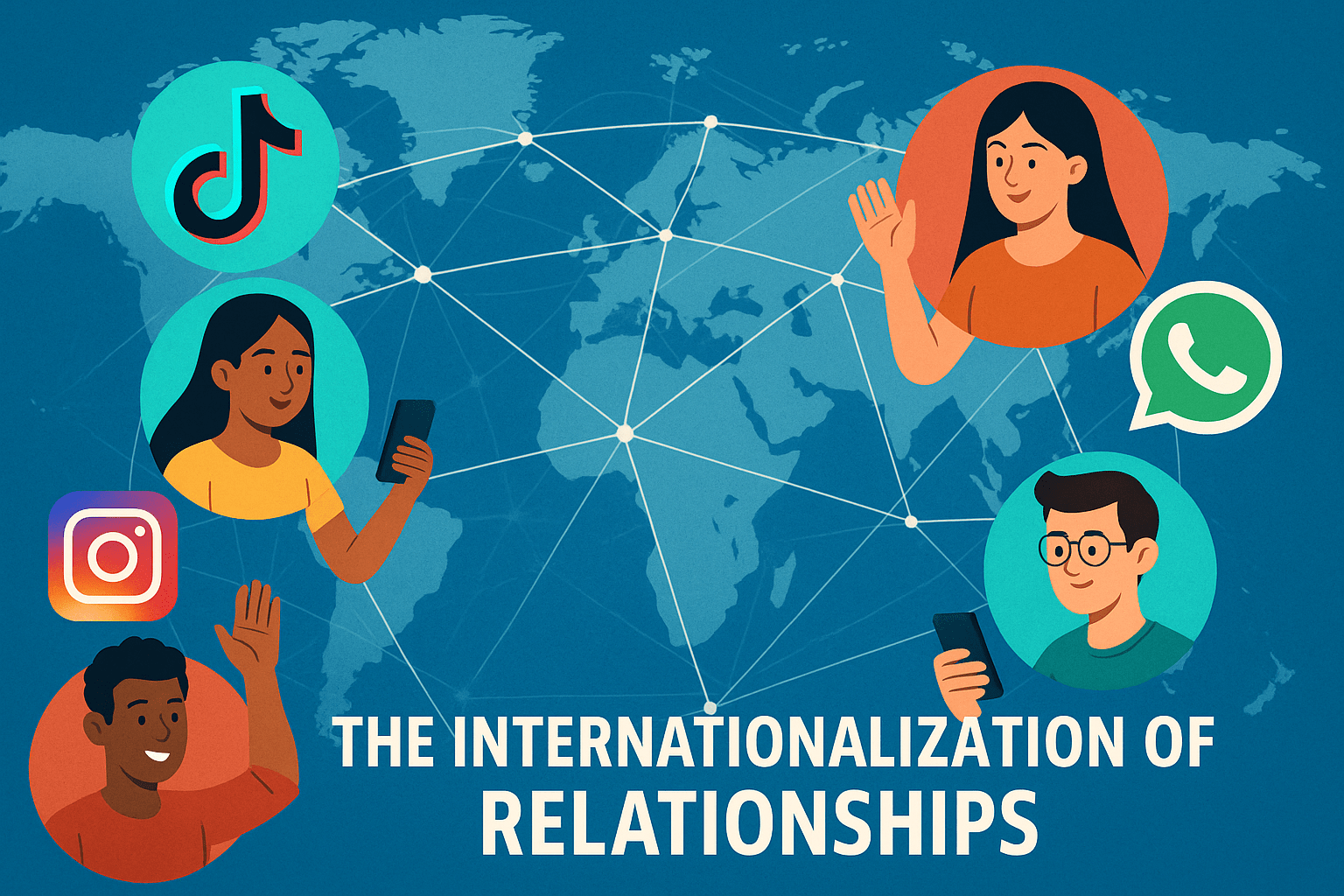The question of how human relationships have evolved in the twenty-first century is impossible to answer without acknowledging the role of the internet and social media. Today, when someone asks me about the internationalization of relationships, I think of how a young woman in Colombia might meet her future partner in India through Instagram, or how a professional in Mexico may build a deep friendship with someone in China over late-night WhatsApp conversations. What was once unthinkable is now routine. The world feels vast, yet at the same time it has shrunk into a global village where distance is only a matter of connectivity.
In this article, I want to deeply explore the internationalization of relationships—romantic, professional, and social. I will analyze the forces that have made this phenomenon possible, from the rise of platforms like TikTok and Instagram to the ubiquity of messaging apps like WhatsApp. I will also reflect on the paradox of this new era: we are closer than ever before, yet sometimes the cultural and emotional distances remain as daunting as ever.
This analysis is not just about technology. It is about people, about how we seek connection, and about how the digital age is reshaping the meaning of intimacy, community, and belonging.
The Birth of a Global Village
To understand the internationalization of relationships, we need to go back to the origins of the internet. The dream of the internet was always to connect people across borders. In its early days, email and chat rooms began the process of breaking down barriers. But it was with the explosion of social media platforms that this dream reached mass scale.
Today, billions of people use apps like Facebook, Instagram, TikTok, and WhatsApp daily. These platforms are not just communication tools—they are ecosystems of connection. They have made it possible for individuals to stumble upon each other’s lives, cultures, and personal stories with just a scroll or swipe. Marshall McLuhan once described television as creating a “global village.” If that metaphor applied in the 1960s, it is infinitely more relevant now.
A young man in Bogotá might discover a fashion influencer from Shanghai on TikTok, follow her Instagram page, and eventually send her a direct message. What would once have been science fiction is now mundane.
Social Media as the New Meeting Ground
If we think about traditional human relationships, geography used to define our social and romantic opportunities. People met their partners at school, in their neighborhood, or at local events. Communities were bound by physical presence. That, is no longer the case.
Instagram, TikTok, and Snapchat have redefined the boundaries of interaction. A single post can go viral, reaching millions of people worldwide, introducing strangers to one another across continents. Algorithms that once only delivered entertainment are now weaving together the social fabric of humanity.
Take TikTok as an example. Its unique ability to surface content from around the world means a teenager in Mexico can easily find herself laughing at skits made by a group of friends in Nigeria. Sometimes these small interactions grow into digital friendships that cross borders and language barriers.
On Instagram, stories and reels create visual diaries of lives happening in real time. They let people in distant countries feel intimately connected to strangers, to their food, their music, and their humor. It is no exaggeration to say that Instagram has become a modern window into the everyday lives of people everywhere.
The Role of Messaging Apps
Yet social media is just the gateway. The true intimacy often happens once a conversation moves to private messaging apps, especially WhatsApp.
WhatsApp has over two billion users worldwide. It is perhaps the single most powerful tool for maintaining cross-border connections. What makes it unique is its blend of simplicity, immediacy, and accessibility. It allows for instant communication without the formality of email or the publicness of social media.
Every relationship today—whether romantic or platonic—inevitably flows into WhatsApp. Two people meet on Instagram, exchange messages, and sooner or later one says, “Let’s talk on WhatsApp.” At that moment, the connection deepens. Suddenly, they are one message away, one call away, no matter if they are separated by oceans.
A Costa Rican student might wake up to good morning messages from a friend in India. A business partnership between Mexico and China may grow entirely through WhatsApp calls. This is the reality of globalization at the most human level.
The Romantic Dimension
The internationalization of relationships is particularly striking in the realm of romance. Dating apps like Tinder, Bumble, and Hinge have already opened the door to meeting people beyond one’s immediate circle. But when combined with social media and global connectivity, romance has gone international in ways never before possible.
It is not unusual anymore for couples to meet entirely online and sustain long-distance relationships through video calls, voice notes, and shared digital spaces. The internet allows them to share experiences—watching movies together via streaming apps, playing games, or even having dinner while on a call.
But this comes with both beauty and challenges. The beauty is obvious: two people from entirely different cultures, separated by thousands of miles, can find love. The challenge is also real: distance requires patience, trust, and resilience. And while the world is technologically closer, physically it remains stubbornly wide. Airfare, time zones, and immigration laws are not as easily conquered as WhatsApp’s green ticks.
Still, I believe this new form of international romance is one of the most remarkable outcomes of the internet age. It proves that love is borderless and that human connection is adaptable to the tools of its time.
Professional and Creative Collaborations
Romance is not the only domain transformed by internationalization. Work and creativity have also become globalized through social media.
An entrepreneur in Argentina can find a supplier in India with a quick LinkedIn search. A musician in Mexico can collaborate with a producer in Los Angeles by exchanging files over Google Drive and discussing details on WhatsApp. Creators can collaborate in real time without ever meeting in person.
TikTok has also become a hub for international creative partnerships. Musicians, dancers, and influencers create joint videos across continents, remixing each other’s content and amplifying their reach. A viral dance might originate in Seoul, be adapted in São Paulo, and find a new twist in Nairobi—all within a week.
This has created not just new friendships, but new economies. The creator economy thrives on cross-border collaboration. Internationalization is not a theoretical concept; it is the foundation of modern digital entrepreneurship.
Cultural Exchange and Understanding
When people ask me why internationalization matters, I say that it is not just about communication—it is about understanding. Through these connections, people are exposed to cultures, traditions, and perspectives that were once inaccessible.
A Mexican teenager might develop a taste for K-pop after befriending a Korean classmate online. A Colombian might become interested in Indian cuisine through daily chats with a friend from Mumbai. Social media has made cultural exchange organic and constant.
Of course, cultural differences can also cause misunderstandings. Humor, expressions, and traditions do not always translate well. But even misunderstandings become opportunities for learning and growth. The more people engage globally, the more they develop empathy and tolerance.
The Paradox of Closeness and Distance
The most fascinating aspect of internationalization, in my view, is its paradox. On one hand, the world feels incredibly close. We can message someone across the globe instantly. We can see their face, hear their voice, and share in their daily lives. On the other hand, physical distance still matters. True closeness often requires being present, sharing space, and experiencing life together offline.
This paradox defines the digital age. We are closer than ever, yet still separated by oceans, borders, and time zones. Everyone is one WhatsApp message away, yet sometimes we feel more isolated than ever. The challenge of our time is to balance the immediacy of digital connection with the depth of real-world relationships.
A New Definition of Relationships
So, what is the internationalization of relationships? It is the redefinition of human connection in a globalized, digital world. It is the ability to build friendships, romances, and collaborations beyond borders. It is the way TikTok dances, Instagram reels, and WhatsApp messages weave people together into a fabric of shared experiences.
This phenomenon has redefined the way we see each other, not just as citizens of individual nations but as participants in a global conversation. The internet has not erased distance, but it has reshaped how we experience it.
Relationships are no longer confined to geography. They are defined by intention, effort, and the ability to adapt across platforms and cultures. Whether it is love, friendship, or collaboration, the internationalization of relationships is proof that human beings will always find ways to connect, even when the world feels impossibly big.
We live in a time where a young woman in Colombia can fall in love with someone in India, where a musician in Mexico can collaborate with a Chinese producer, and where a businessman in Nigeria can partner with someone in Argentina—all from their phones.
What is extraordinary is how normal this has become. The extraordinary has turned into the everyday. That is the true mark of progress: when something once unimaginable becomes simply ordinary.
The internationalization of relationships is not just about technology. It is about the human spirit’s constant search for connection, intimacy, and belonging. It is about how we adapt to the tools of our time to build bridges across distance and difference. And it is about the reminder that while the world is so close and yet so far, one message is all it takes to make it feel like home.








